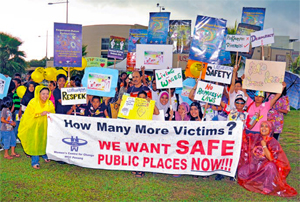 At first glance, the newly remodelled, periwinkle building situated on the corner of one of George Town’s busiest intersections could house anything. Visitors are greeted by a host of casually dressed women, a few without shoes on, sporting easy, friendly smiles. Every one of them looks you in the eye. This sort of warmth may be implicit to the women who work here, but it also seems to be the best and only coping mechanism the women have when it comes to the content of the work they carry out – work that could make anyone with the wrong attitude downright depressed. This is the office of Penang’s Women’s Center for Change (WCC), a nonprofit organisation dedicated to putting an end to domestic abuse and promoting women’s rights.
At first glance, the newly remodelled, periwinkle building situated on the corner of one of George Town’s busiest intersections could house anything. Visitors are greeted by a host of casually dressed women, a few without shoes on, sporting easy, friendly smiles. Every one of them looks you in the eye. This sort of warmth may be implicit to the women who work here, but it also seems to be the best and only coping mechanism the women have when it comes to the content of the work they carry out – work that could make anyone with the wrong attitude downright depressed. This is the office of Penang’s Women’s Center for Change (WCC), a nonprofit organisation dedicated to putting an end to domestic abuse and promoting women’s rights.
The atmosphere at the WCC may be warm, but the work accomplished every day, both inside and outside of the purple building, can be anything but, and visitors are confronted with newspaper clippings and fact-sheets that provide a picture of how serious the WCC’s mission can be. Although Malaysia was the first Muslim country to pass a law against domestic violence in 1994, psychological abuse was only just added into the law last year. A drastic amount of violence still remains unresolved due to the dearth of governmental infrastructure when it comes to women’s support, i.e. the lack of safe-houses, the lack of hospital units dedicated to abuse victims, and the lack of court support for women who wish to get out of an abusive marriage. These shortcomings produce mind-blowing statistics – a study by WCC in the Penang courts showed that over 45% of rape cases are acquitted not amounting to dismissal before they ever make it to full trial.
Lack of support for women affects the workforce as well. It was not until 2001 that gender discrimination was made illegal, and sexual harassment remains a contentious subject in the law books. The harassment section incorporated into the Employment Act states that the employer, rather than the employee, is responsible for deciding whether the sexual harassment reports make it out of the office at all. Because of these difficulties, as well as the lack of childcare, the labour participation rate for women has remained around 43-46% for the last several decades. Women represent a small fraction of parliament, and no more than a few percent of the government workforce.
Loh Cheng Kooi, WCC’s executive director, is well aware of the challenges her organisation faces in the political sector. WCC, along with their partner organization JAG, the Joint Action Group for Gender Equality, has been key in lobbying for legal and policy reforms affecting women and children’s rights in Malaysia.
“Women’s issues have had several good legal reforms, but they are piecemeal,” explains Cheng Kooi. “We’re working hard to get these laws into better shape so that our country’s women have access to the basic rights of workplace safety, personal safety, and proper legal protection.” Advocating for change can prove taxing but Cheng Kooi, like the rest of the strong women in the WCC office, remains fiercely optimistic about Malaysia’s future.
While they wait for the necessary policy changes, WCC continues to provide an ample support network for the women in their community and beyond. Their services include free in-house counselling and emotional support for women in crisis, temporary free shelter for abused women and their children, free legal advice for women going on trial, and, most recently, a rape support network. The latter is a particularly meaningful addition to their work repertoire – 50% of the rape victims they support are under the age of 16.
These programs support over 3,000 women a year, making the WCC one of Malaysia’s largest women’s organisations, and certainly the most active. WCC also provides educational outreach both to the general community and to young people in the area. These programs are aimed at awareness and prevention, encouraging youth to take the right steps if they witness or are victim to any sort of abuse, and informing them what that abuse may look like.
Friendly and warm as they are, the women of the WCC are also warriors for a cause. They have dedicated their careers towards bringing equality to their country, and fighting for women and children who do not have the resources to do so themselves. If, as Loh Cheng Kooi believes, change begins with strong female leaders, then the women of the WCC are surely leading the charge.
For more information on the Women’s Centre for Change visit www.wccpenang.org.
This article was written by Kat Fatland for The Expat magazine.
Source: The Expat July 2012
Click here for your free print subscription and free delivery of The Expat.
"ExpatGo welcomes and encourages comments, input, and divergent opinions. However, we kindly request that you use suitable language in your comments, and refrain from any sort of personal attack, hate speech, or disparaging rhetoric. Comments not in line with this are subject to removal from the site. "






















